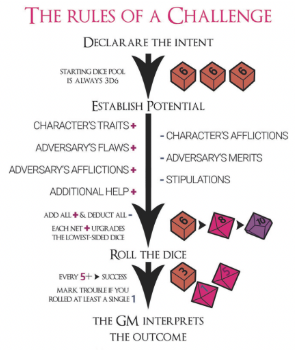Podcast: Play in new window | Download (Duration: 38:34 — 35.3MB)
Subscribe: Apple Podcasts | Google Podcasts | Stitcher | TuneIn | RSS | More
Audio PlayerIn this episode of The Reviews, The Caleb G ( @TheCalebG ) take a look at Defiant RPG by Game Machinery (@Thilnen )
Thank you to Game Machinery for providing us with a review copy.
Howdy cats and kittens! It’s TheCalebG aka Professor Crunch aka the founder of Point Five Past.Today I’m here to review Defiant, a game published by Game Machinery and currently available on DriveThruRPG. The publishers were kind enough to send a copy of the book along with the various resources needed to play the game for the purpose of this review.
Defiant was successfully funded by 543% on Kickstarter in July of 2021. The campaign met 10 of its 12 stretch goals. There are currently 3 supplemental books available for purchase and a free Quick Start guide. The Kickstarter campaign mentions an online system to manage characters and games, but as of the writing of this article this resource is still under construction. The core book comes in both a standard print layout and a screen-friendly layout, which is a great approach for our digital gaming environment.
Quick Overview
 Defiant is an urban fantasy game with a focus on political drama and intrigue. The story is set against the background of an ongoing apocalypse. Players create supernatural characters who are part of elaborate courts that are safe havens from apocalyptic danger and mortal observation. Gameplay is focused on managing court expectations and responsibilities while maneuvering and manipulating others to accomplish a variety of goals. Although it is not the focus, many themes in the game are mature and not for younger players.
Defiant is an urban fantasy game with a focus on political drama and intrigue. The story is set against the background of an ongoing apocalypse. Players create supernatural characters who are part of elaborate courts that are safe havens from apocalyptic danger and mortal observation. Gameplay is focused on managing court expectations and responsibilities while maneuvering and manipulating others to accomplish a variety of goals. Although it is not the focus, many themes in the game are mature and not for younger players.
Book and Resources
The print version of Defiant is just over 300 pages and the screen-friendly version is just over 600. Most of the book is focused on how to prepare and play the game. It seems like common sense to say this, but given the intent of the game, this a crucial point to recognize. More on that later.
Interestingly, the book’s art was “made using stock images from paid and free sites.” My understanding of this is that the stock images were used as a base for the art. Characters are depicted as ultra-rich socialites with typical supernatural details like wings or horns. The art is striking, with mostly yellow and purple tones, which gives a surreal depiction to everything. Note that while none of the art is explicit, there are risqué depictions of mature content. Nothing here is worse than you’d see in a fashion magazine or on Instagram, but there are quite a few implications being made. This is not a book for kids.
There is a good, common sense flow to how the information in the book is given to readers. Given the complex nature of Defiant, this is a smart move. Starting with the foundation of a quick overview of the game and its intent, the book then builds by explaining the game’s setting and how to prepare for the first game session. It is comforting to see a focus on Line and Veil rules here, considering the adult nature of much of this content.
Game mechanics are referenced but not explained in detail until around 70 pages into the book. Similarly, character abilities and details are discussed but not given details until almost 200 pages into the book. Normally, this is something I would call out as a concern. However, given the need to understand the social dynamics of this game world, I feel that the focus on how to facilitate this type of game and the unique nature of the game world is the best approach. Additionally, the mechanical structure of characters is addressed during character and game creation with the included game resources.
Speaking of resources, Defiant provides a lot of them. This is an appreciated decision, as the specific details of game mechanics are on the complex side. Maps and reference cards provide details of the setting and reminders about how everything works. Cards are also used in character creation. More on that later. These resources are clear and easy to use, giving enough information to keep the game moving without having to dig through the book.
Story
 The apocalypse is happening right now in Defiant. But due to illusions maintained by powerful magic, mortal folks don’t know this. Terrible apocalyptic events are understood as acts of terrorism, tragic accidents, or environmental disasters. Players take on roles of supernatural beings that once were part of carrying out the apocalypse but have decided to defy their responsibilities.
The apocalypse is happening right now in Defiant. But due to illusions maintained by powerful magic, mortal folks don’t know this. Terrible apocalyptic events are understood as acts of terrorism, tragic accidents, or environmental disasters. Players take on roles of supernatural beings that once were part of carrying out the apocalypse but have decided to defy their responsibilities.
Safety in this world is found in the Domains of the Defiant. These are small pockets of supernatural civilization hidden within regular cities inhabited by mortals. Domains are isolated from each other, so each game that’s played takes place completely within one single Domain. The safety of Domains are maintained by following strict rules and structure, which leads into the court hierarchy structure of the game.
Characters come from one of four supernatural origins. Angels are fallen divine servants; Daeva are former gods and legendary creatures; Leviathans are ancient draconian forces of destruction; Infernals are tormented humans who became tormentors over centuries of suffering.
The majority of daily activity in Defiant is focused on maintaining the status-quo of the Domain to ensure that the apocalypse remains safely outside its walls. As powerful as the characters are within a Domain, they cannot fight against creatures still serving in the apocalyptic war. These creatures are also grouped into four origins, this time based on the classic mythology of the Four Horsemen of the Apocalypse. These creatures might infiltrate or take action against a Domain, but this is very rare.
Mechanics
The core dice mechanic in Defiant is a fairly simple dice pool roll of 3d6 with successes generating from a result of 5 or higher. But instead of a more typical mechanic of adding successes to a stat or attribute, a character’s Potential allows players to increase the dice size up to a maximum of d10s while success is still determined with a result of 5 or higher. Potential is gained from a variety of sources such as character traits, adversary flaws, and outside sources of help. Potential can be reduced by things such as an enemy’s advantages or a character’s weaknesses.
Potential increases dice one at a time starting with the lowest die. So 1 Potential would let a player roll 1d8 and 2d6, 2 Potential would let a player roll 2d8 and 1d6, and so on.
There is also a resource called Shards. These can be used to add a d8 to the dice pool, which can then be upgraded with Potential as normal. Shards have a variety of other uses related to character abilities.
When it comes to the dice pool mechanic, this is a relatively simple system. There is some complication in finding all the ways that Potential is gained and lost, but this becomes much easier as the game progresses.
Character Creation and Gameplay
Building a supernatural character in Defiant is both simple and complex. On the simple side, there are no stats or attributes. Characters are defined in themes and traits which are all descriptive words or phrases. Also, everything is done with cards. Players randomly select cards to define all important aspects of their character from their supernatural origin to their standing in their court to, believe it or not, their marital status. Once these choices are made and details are recorded on a character sheet, character creation is done. Compared to the more typical number- and option-heavy character creation process, this is a breeze.
But on the complex side, character creation is far more involved than making these simple choices. Unless the group is playing in a pre-made Domain, players are also creating their home town and court while making characters. They are fleshing out all the NPCs that hold specific court roles. The hierarchy of the courts in Defiant are crucial to the overall story. If the rules of the Domain are not met through the structure of the court, the magic that holds back the apocalypse fails. And don’t forget that regular folks also exist in this supernatural world. Interaction with them is rare, but they are still a factor of how the Domain operates. Thus, character creation in Defiant is more along the lines of world creation. This isn’t terribly complicated as most things are defined with a few simple phrases, but it is a very different experience when compared to other games.
Playing Defiant is similarly different from other RPGs. The focus is not on combat or exploration. Instead the game is about managing the daily activities and responsibilities of the court while also pursuing individual goals of advancement. Conflict comes from clashing schemes and personalities. Physical combat can occur, but it’s typically in the form of a tournament or a duel. Defiant is about playing politics and managing grand plans over a long term. To support this structure, a campaign is organized like a television show with a Season that is broken into six to ten Episodes. Character abilities are focused on supporting this narrative structure and prompt players to ask large-scale questions that introduce new elements into the game and move the story forward.
Opinion
 Defiant presents an impressive concept and supports it with a vivid world and clever mechanics. The rules at the core of the game are easy to understand which helps players focus on developing a shared narrative experience at the table.
Defiant presents an impressive concept and supports it with a vivid world and clever mechanics. The rules at the core of the game are easy to understand which helps players focus on developing a shared narrative experience at the table.
That being said, Defiant is a very niche game. This is not an easy game to pick up and play at random. This is a game where everyone needs to share the same mindset, expectations, and mental preparation. Given the type of gameplay and mature themes in Defiant, players need a high degree of comfort and trust with each other. Luckily, the book is full of reminders about how to play the game successfully and safely. But this is not a game for younger players and probably is not what you’d play randomly at a convention or run for strangers.
I commend the writers for taking on an ambitious topic and presenting it in an accessible way. Personally, I’ve always struggled with how to best execute a game of intrigue and political drama and the mechanics here are a perfect approach. I also love how the writers embrace and support the LGBTQIA+ community and present a refreshing attitude of inclusivity.
Defiant is a narrative-focused game about social elite with supernatural powers pursuing their own agendas while also maintaining their responsibilities in strict court hierarchy with the apocalypse ongoing in the background. Why the CW hasn’t optioned this for a new show yet is beyond me. The game is focused on style but delivers the substance needed to tell a great story. This is not something I’ll likely play at length. It’s just not the right game for me and my typical players. But I like what Defiant presents and how it executes the concept. If you are seeking this type of story, I can’t think of another game that presents the concept in such an accessible and streamlined way.
THE RATING:
The Caleb G: B
If you’d like to grab a copy of Defiant (or anything) from DriveThruRPG please use our link first and we get a small % of what you pay.
If you’d like to support the RPG Academy you can use this AMAZON link and then purchase anything from amazon you’d like. Use it every time you shop there, and the RPG academy will get a small % of what you spend.
Thanks!!
Please consider contributing to my Patreon, making a modest donation via Paypal or even support your show at no extra cost via your purchases on DriveThru RPG.
Email: TheRpgAcademy@gmail
Twitter / Facebook / Website
Playing Roleplaying games can be an amazingly fun time and also a benefit to your well being. If you or someone you know is struggling with mental or emotional well being, please reach out to someone who can help:
National Suicide Prevention Lifeline – 1-800-273-8255
Crisis Text line: Text HOME to 741741
Our Intro and Outtro music is Fly a Kite by Spectacular Sound Productions used via Creative Commons Attribution License








